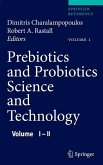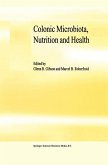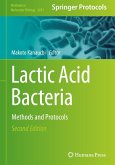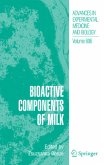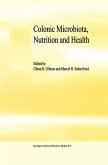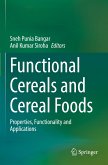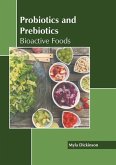Methods in Probiotics Research
Herausgeber: Ahire, Jayesh J.; Mishra, Vijendra; Dhewa, Tejpal; Dicks, Leon Milner Theodore
173,99 €
inkl. MwSt.
Versandkostenfrei*
Erscheint vorauss. 15. Januar 2026
Melden Sie sich
hier
hier
für den Produktalarm an, um über die Verfügbarkeit des Produkts informiert zu werden.

87 °P sammeln
Methods in Probiotics Research
Herausgeber: Ahire, Jayesh J.; Mishra, Vijendra; Dhewa, Tejpal; Dicks, Leon Milner Theodore
- Gebundenes Buch
While numerous books have been published in the area of probiotics but no book has been reported exclusively on methods adopted in probiotics research. This book is aimed at researchers who are involved in conducting research on wide applications of probiotics. To establish any organism as probiotics, it needs to pass through number of tests. The isolation and identification techniques need to be chosen carefully. The assessment of probiotics attributes is to be done by a series of in-vitro and in-vivo experiments. Clinical trials are also conducted to evaluate the efficacy and safety. The use…mehr
Andere Kunden interessierten sich auch für
![Prebiotics and Probiotics Science and Technology Prebiotics and Probiotics Science and Technology]() Dimitris Charalampopoulos / Robert A. Rastall (ed.)Prebiotics and Probiotics Science and Technology483,99 €
Dimitris Charalampopoulos / Robert A. Rastall (ed.)Prebiotics and Probiotics Science and Technology483,99 €![Colonic Microbiota, Nutrition and Health Colonic Microbiota, Nutrition and Health]() GibsonColonic Microbiota, Nutrition and Health121,99 €
GibsonColonic Microbiota, Nutrition and Health121,99 €![Lactic Acid Bacteria Lactic Acid Bacteria]() Lactic Acid Bacteria169,99 €
Lactic Acid Bacteria169,99 €![Bioactive Components of Milk Bioactive Components of Milk]() Bioactive Components of Milk161,99 €
Bioactive Components of Milk161,99 €![Colonic Microbiota, Nutrition and Health Colonic Microbiota, Nutrition and Health]() Colonic Microbiota, Nutrition and Health116,99 €
Colonic Microbiota, Nutrition and Health116,99 €![Functional Cereals and Cereal Foods Functional Cereals and Cereal Foods]() Functional Cereals and Cereal Foods85,99 €
Functional Cereals and Cereal Foods85,99 €![Probiotics and Prebiotics: Bioactive Foods Probiotics and Prebiotics: Bioactive Foods]() Probiotics and Prebiotics: Bioactive Foods169,99 €
Probiotics and Prebiotics: Bioactive Foods169,99 €-
-
-
While numerous books have been published in the area of probiotics but no book has been reported exclusively on methods adopted in probiotics research. This book is aimed at researchers who are involved in conducting research on wide applications of probiotics. To establish any organism as probiotics, it needs to pass through number of tests. The isolation and identification techniques need to be chosen carefully. The assessment of probiotics attributes is to be done by a series of in-vitro and in-vivo experiments. Clinical trials are also conducted to evaluate the efficacy and safety. The use of latest genome based tools have enhanced the spectrum of understanding for probiotics.
Hinweis: Dieser Artikel kann nur an eine deutsche Lieferadresse ausgeliefert werden.
Hinweis: Dieser Artikel kann nur an eine deutsche Lieferadresse ausgeliefert werden.
Produktdetails
- Produktdetails
- Verlag: Taylor & Francis Ltd
- Seitenzahl: 312
- Erscheinungstermin: 15. Januar 2026
- Englisch
- Abmessung: 234mm x 156mm
- ISBN-13: 9781138626355
- ISBN-10: 113862635X
- Artikelnr.: 60008957
- Herstellerkennzeichnung
- Libri GmbH
- Europaallee 1
- 36244 Bad Hersfeld
- gpsr@libri.de
- Verlag: Taylor & Francis Ltd
- Seitenzahl: 312
- Erscheinungstermin: 15. Januar 2026
- Englisch
- Abmessung: 234mm x 156mm
- ISBN-13: 9781138626355
- ISBN-10: 113862635X
- Artikelnr.: 60008957
- Herstellerkennzeichnung
- Libri GmbH
- Europaallee 1
- 36244 Bad Hersfeld
- gpsr@libri.de
Dr. Vijendra Mishra obtained his doctorate in Dairy Microbiology from National dairy Research Institute, Karnal, India. During his Ph.D. he worked on studying probiotics properties of Lactobacillus casei. Before joining his current assignment as Associate Professor (Microbiology) at National Institute of Food Technology Entrepreneurship and Management (NIFTEM), Kundli, Haryana in 2011, he worked for a decade in various institutions, notably being Anand Agricultural University, Anand (Gujarat), India. Dr. Mishra is involved in teaching, research and administration at NIFTEM. He is currently teaching UG, PG and Ph.D. students with special focus development of probiotics products with enhanced shelf life and safety aspects of probiotics. Dr. Mishra has published more than 30 papers, 10 book chapters and general articles and 25 presentations in national and international conferences. He has received Young Scientist award from Association of Microbiologists of India, Award for researchers mobility for Slovak Republic besides receiving Senior Research Fellowships from Indian Council for Agricultural Research, India. He is invited reviewer of more than 10 International scientific journals. Prof. Dicks devotes his research on lactic acid bacteria (LAB), with a special interest in antimicrobial peptides and probiotic properties. He has published 194 research papers in ISI-rated journals, contributed to 25 book chapters and filed nine patents. He described a number of new species and was the first South African to participate in the writing of chapters (eight in total) for the bacterial taxonomy guide Bergey's Manual of Systematic Bacteriology. His group was the first to incorporate antimicrobial peptides of LAB in nanofibers and have developed a nanofiber wound dressing with antimicrobial properties (patent PCT/IB2010/054653). Prof Dicks received the Rector's award for outstanding research in 2000 and 2010, the silver medal for research from the SA Society for Microbiology in 2004, and the National Science and Technology Forum (NSTF)-BHP Billiton award in 2012 for research over the last 5-10 years. Dr. Tejpal Dhewa obtained Ph.D. in Microbiology from Bundelkhand University, Jhansi, India. He joined as Assistant Professor (Microbiology), Bhaskaracharya College of Applied Sciences (BCAS), University of Delhi, New Delhi, India in 2011. Before moving to BCAS, he was at Dolphin (PG) Institute of Biomedical & Natural Sciences (DIBNS), Dehradun, UK, India from 2005 to 2011. Dr. Dhewa has published more than 25 papers, 10 presentations in National and International Seminars and Conferences, 1 book, 3 monographs, 3 popular articles, and several book chapters to his credit. Dr. Jayesh J. Ahire obtained his Ph.D in Microbiology (Probiotics and its biogenic metabolites) from North Maharashtra University, Jalgaon, India. He is presently a Postdoctoral Fellow in the laboratory of Prof. Leon Dicks, Department of Microbiology, Stellenbosch University, Stellenbosch, South Africa. His current research involves incorporation of antibacterial peptides, drugs and iron chelators in nanofibers, particularly in relation to develop topical and surgical dressings. He has also published several peer-reviewed articles in the field of probiotics and bio-nanotechnology. His main research interests are probiotics, antimicrobial peptides and nanotechnology for the prevention and treatment of infections.
Detection of probiotic bacteria using PCR based methods. Whole genome
sequencing of Probiotic Lactobacillus species. Probiotics and metagenomics
of gut pathogen. Microencapsulation of probiotics to enhance viability.
Assessment of probiotic attributes in new strains. Solid state fermentation
technology for probiotic products. Bio-safety of probiotics in terms of
antibiotic resistance. Technological challenges for future probiotics
foods. Regulatory guidelines on probiotics. Evaluation of safety and
efficacy of probiotics through clinical trials. Drying techniques for
probiotics. Methods to assess the antioxidative properties of probiotics.
Application of Proteomics in probiotics research. Challenges in industrial
applications of probiotics. Delivery of probiotics through different foods
as carrier matrices. Statistical and computational tools to study
probiotics.
sequencing of Probiotic Lactobacillus species. Probiotics and metagenomics
of gut pathogen. Microencapsulation of probiotics to enhance viability.
Assessment of probiotic attributes in new strains. Solid state fermentation
technology for probiotic products. Bio-safety of probiotics in terms of
antibiotic resistance. Technological challenges for future probiotics
foods. Regulatory guidelines on probiotics. Evaluation of safety and
efficacy of probiotics through clinical trials. Drying techniques for
probiotics. Methods to assess the antioxidative properties of probiotics.
Application of Proteomics in probiotics research. Challenges in industrial
applications of probiotics. Delivery of probiotics through different foods
as carrier matrices. Statistical and computational tools to study
probiotics.
Detection of probiotic bacteria using PCR based methods. Whole genome
sequencing of Probiotic Lactobacillus species. Probiotics and metagenomics
of gut pathogen. Microencapsulation of probiotics to enhance viability.
Assessment of probiotic attributes in new strains. Solid state fermentation
technology for probiotic products. Bio-safety of probiotics in terms of
antibiotic resistance. Technological challenges for future probiotics
foods. Regulatory guidelines on probiotics. Evaluation of safety and
efficacy of probiotics through clinical trials. Drying techniques for
probiotics. Methods to assess the antioxidative properties of probiotics.
Application of Proteomics in probiotics research. Challenges in industrial
applications of probiotics. Delivery of probiotics through different foods
as carrier matrices. Statistical and computational tools to study
probiotics.
sequencing of Probiotic Lactobacillus species. Probiotics and metagenomics
of gut pathogen. Microencapsulation of probiotics to enhance viability.
Assessment of probiotic attributes in new strains. Solid state fermentation
technology for probiotic products. Bio-safety of probiotics in terms of
antibiotic resistance. Technological challenges for future probiotics
foods. Regulatory guidelines on probiotics. Evaluation of safety and
efficacy of probiotics through clinical trials. Drying techniques for
probiotics. Methods to assess the antioxidative properties of probiotics.
Application of Proteomics in probiotics research. Challenges in industrial
applications of probiotics. Delivery of probiotics through different foods
as carrier matrices. Statistical and computational tools to study
probiotics.

